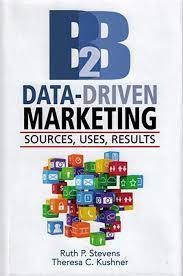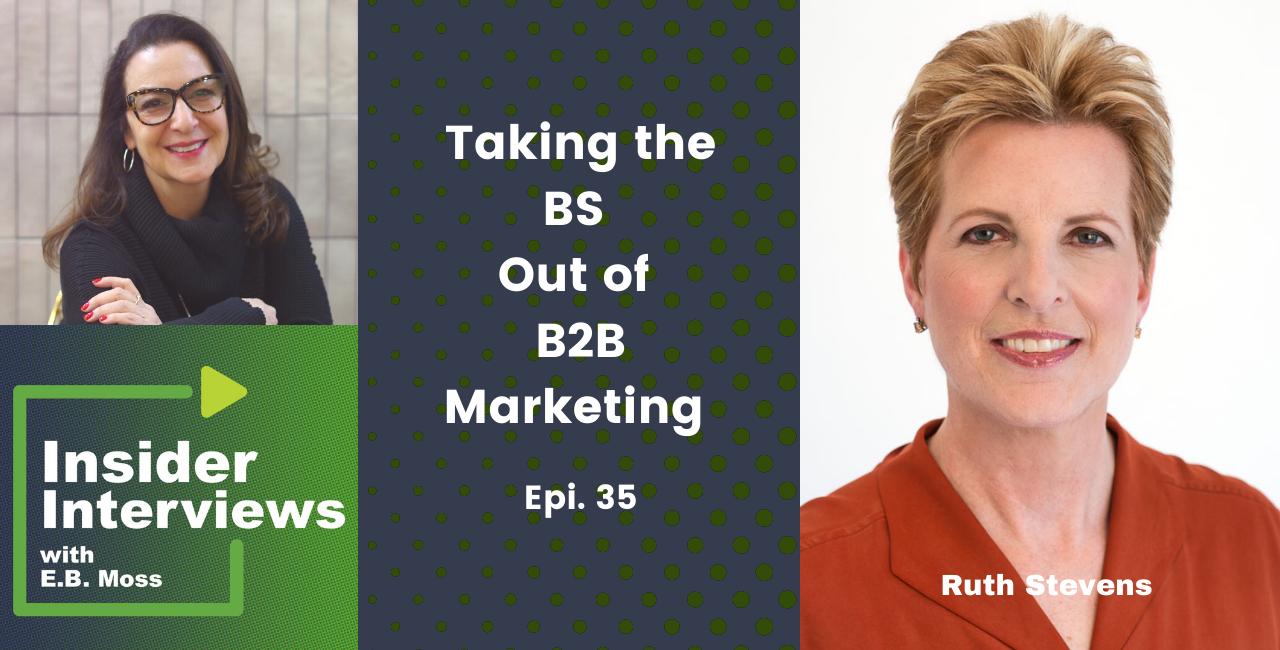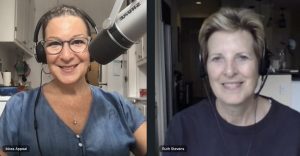Podcast: Play in new window | Download (Duration: 35:39 — 49.4MB) | Embed
Subscribe or Follow Spotify | Android | Pandora | iHeartRadio | TuneIn | Deezer | RSS | More
Today’s episode could be a lesson plan about B2B Marketing because my guest, Ruth Stevens, has been teaching business to business marketing at NYU, Columbia, and B-schools around the world. And that’s in between being one of the foremost consultants in the space. So, Stevens calls BS on certain approaches to B2B we all better sit up and listen. Hear about the “fails” AND the best practices for what makes customers sit up and listen, too!
Stevens went right from business school herself to TimeWarner’s Book of the Month division, “thinking that I was joining one of the great book marketing companies in the world. I learned I was actually in one of the great direct marketing companies in the world.” After seven years of getting schooled in DM she mastered B2B first at Ziff Davis then IBM, simultaneously writing columns as well as teaching others at night.
In one example of her “no BS advice” articles, which appear everywhere from Biznology.com to HBR.org, Stevens says, “Don’t Be a Jerk on LinkedIn”, and advises sellers everywhere not to jump to the pitch. (“Building relationships on social media is hard. People get lazy and go straight to being the seller, and skip the personal establishment part. They’re also just sorely tempted by how easy it is to just make a mass pitch using LinkedIn Sales Navigator.”)
And, heed Stevens when she notes:
Today the ability of the salesperson to guide a purchase in their direction, but also to understand more deeply the needs of the buyer, has been eroded. So the marketer needs to step in and provide the educational content. This has driven the huge rise of B2B content marketing to allow that researcher better understanding of how to solve a problem or how your solution can be helpful, and to guide them toward calling you.
Companies’ approach to client retention is also in need of schooling:
Another area where I see B2B companies failing, or sub-optimizing, is retention marketing and it just drives me crazy because this is where the bulk of profits arise. Most companies organize it to be the responsibility of someone called ‘account management’, which is an important function, but marketing is not being asked to support it.
Stevens feels for the challenges faced by marketers and sellers these days in getting to know or reach know the buyer and ever-expanding buying groups — especially in enterprise purchasing:
Marketers need to try to replicate that old relationship building aspect by identifying the members of the buying circle and either find out through outbound calling, for example, or social listening, or infer what their agendas are, because each member of the buying circle usually has a different agenda, different need. And then try to serve those needs on a one-to-one basis. And despite all of our wonderful MarTech and data, it’s really hard to do.
That’s also why events (especially virtual events) have taken on an even larger role — as a place researchers can get their questions answered. So, Stevens points out, we need to be even more active at business events than before, and to create our own opportunities, webinars and meetings to build those now more elusive business and sales relationships.
The trick there, as with everywhere, as you’ll hear in this episode, is how one shows up at those events or in that content. No pants on a Zoom aside, business presence still needs panache and empathy.
You’ll hear many tips and lessons from “Professor Stevens” in this episode, including:
-
How creative still needs to be about education, but in a context that captures attention and builds trust.
-
How and why we stumble when we try to apply traditional consumer creative strategies to B2B and risk sounding “tinny or irrelevant” — but why storytelling is still a “watchword” for B2B.
-
Why it’s wrong for the brand power to be measured by if it helps the salesperson get a meeting: “Asking marketers to base their entire value proposition to the firm on sales results unfairly puts the sales piece of the puzzle into the marketer’s metrics kit. If the marketers are handing good quality leads and generating interest and a perception of value in the marketplace, and the sales team can’t close the deal, then marketing shouldn’t be taking the hit for that… We need other metrics to help marketers understand what they’re delivering and help management.”
-
And, since Stevens also wrote the book on data-driven marketing (literally) she suggests looking at such metrics as cost per lead, or cost for qualified lead. While lead-to-sales conversion rate shouldn’t be marketing’s, “we need an awareness metric. Or maybe a trust metric, that can credit marketing with all of the earlier pre-lead stuff.”
-
Why the goal of B2B marketing is to communicate that “We are experts in the problem that you have, and you can trust us to help you solve the problem”, but needs to get that across without saying as much and still creating an emotional connection even though you’re buying for business purposes.”

Hey, her words, not mine, but: “this is why the B2B agency function exists in the world because they know what they’re doing and they can come up with messaging strategies that grab attention and deliver the message and in a way that makes sense to the business buyer.”
Finally, as I’m also Editor of The Continuum, a publication about brand and demand marketing, I had to ask if there’s a difference in awareness and performance marketing for B2B vs. B2C. The professorial answer?
“No, it’s the same concept: you need brand and demand for both B2B and B2C, but down on the ground, we’re talking about a very different buying process: B2B is more complicated. It’s longer. It involves more individuals, all of whom have to be engaged with and influenced… such as when it comes to raw materials, professional services, technology, and other business process oriented purchasing, which typically involve a large number of people. So the whole sales and marketing function needs to support that.”
Please find and follow Ruth Stevens for B2B help without the BS:
LinkedIn: http://www.linkedin.com/in/ruthstevens
Twitter: https://www.twitter.com/RuthPStevens
Facebook: https://www.facebook.com/emarketingstrategy
Please follow E.B. Moss and Insider Interviews on:
Twitter:
@mossappeal
@InsiderIntervws
IG:
@insiderinterviews
@mossappeal
Facebook: InsiderInterviewsPodcast



